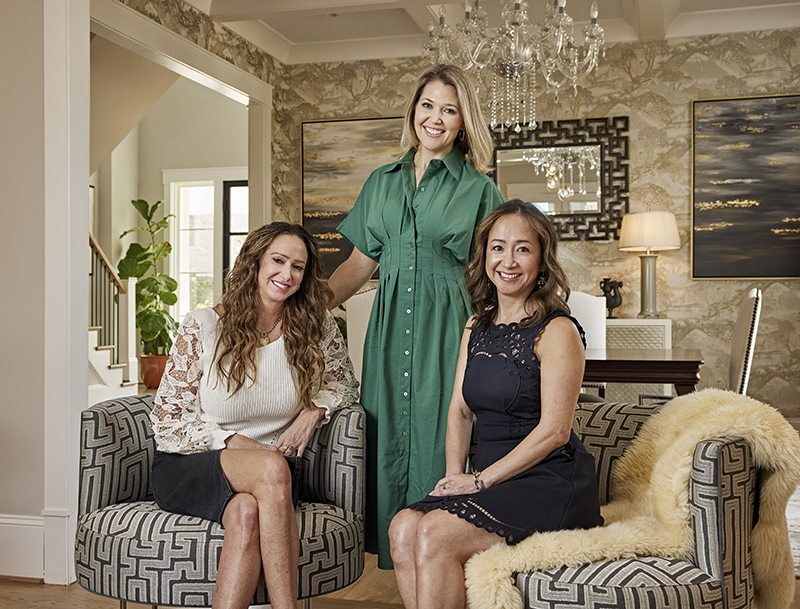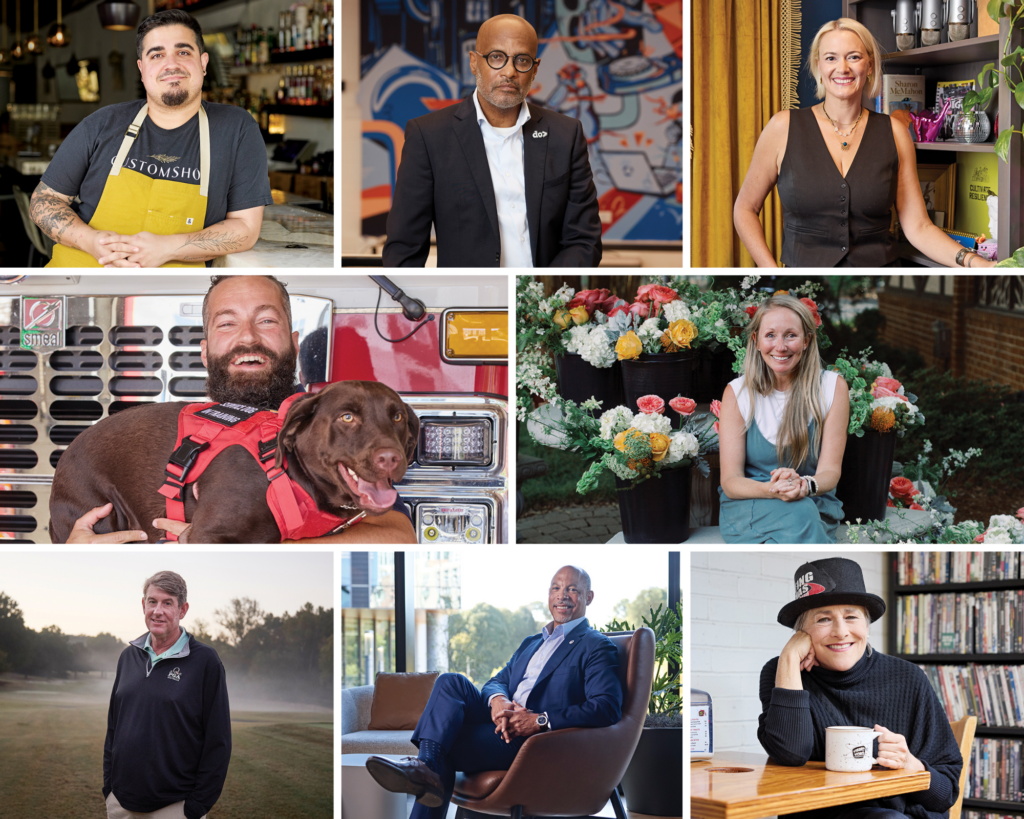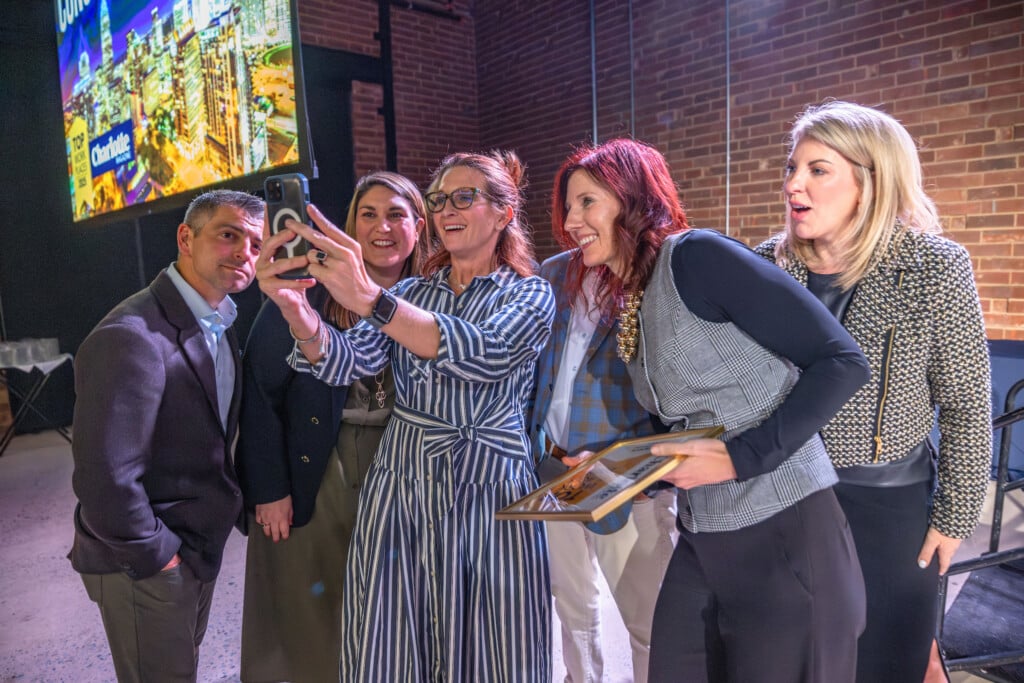Charlotte Mothers & Daughters Are Turning Periods and Puberty Into A Party
Girlhood Charlotte and Growing Our Girls make room for uneasy talks about menstruation

Last spring, Kristin Mountcastle hired Girlhood Charlotte, a business that educates girls about puberty, to host a “period party” for a group of fifth-grade girls and their moms. Mountcastle was starting her own business for moms and girls, but that didn’t mean her 12-year-old daughter wanted to get together with friends to talk about puberty. “Ella Scott was not excited about it at all,” Mountcastle, who also has two younger daughters, says with a laugh.
The get-together began at her home in Dilworth on a Sunday morning. “We had bagels and parfaits and a mimosa bar,” she says. “It had a brunchy feel to it.” The initial vibe was part nervousness, part curiosity, thanks to themed decorations: Uterus-shaped confetti sprinkled on coffee tables, uterus bunting along the buffet table, and a metal replica of a uterus. “It kind of smacks you in the face,” Mountcastle says. “Like, whoa, we’re here to talk about uteruses.”
But as mother-daughter pairs piled onto couches and chairs in the living room, everyone seemed to relax. “The girls got really excited about the food,” she says, “and they had each other.”
A Girlhood Charlotte party is like a multigenerational “girls night in” with a purpose—and a dynamic pair of period and puberty experts. Mary Queen, a postpartum nurse, and Diep Nguyen, a pediatrician, are part-time Atrium Health employees who connected through their 12-year-old daughters’ friendship. Their idea for Girlhood Charlotte was born on the sideline of a soccer game in fall 2023. After a chat that included, “Have you had the talk with her yet?” and “Me, neither,” Nguyen and Queen hatched the plan that became their side hustle.
Girlhood Charlotte wants to not only educate girls about their bodies but help girls and their moms have those conversations earlier. “We want these period conversations at 9 or 10 to be a foundation for the kinds of conversations they’ll need to be having at 13 and 14,” Nguyen says. “It takes practice learning to talk about the uncomfortable things.”
To navigate what she calls “desirable discomfort,” Queen opens every party by inviting moms to tell the group a funny or embarrassing period memory. “It breaks the ice and sets it up where the girls feel comfortable,” she says. At Mountcastle’s gathering, all it took was one bold person sharing one cringey story: First periods during gym class, staining a chair (or just fearing they would), not knowing how to use a tampon and quitting the swim team as a result. “Then,” she says, “the other moms are like, ‘Oh my God, me, too.’”
Queen and Nguyen say most of the moms have something else in common: Many didn’t talk—really talk—about periods with their moms. So sometimes, when Nguyen leads a short anatomy lesson with the group, she educates girls and moms alike. “We were looking at each other’s papers like, ‘What’s this hole? Have you heard of an anal canal?’” Mountcastle says. “Clearly, we’re learning, too.”
Organizations like Girlhood Charlotte signal a new interest in repairing and re-educating women who had uncomfortable experiences around puberty. Women’s health has been deprioritized and under-researched for a long time, “but I think we’re finally seeing a shift,” says Emily Swanigan, a spokesperson for Period, a Portland, Oregon-based nonprofit that focuses on menstrual issues. “It’s generations of women … being like, ‘This is ridiculous not to talk about bodies and women’s health.’”
Swanigan points to new studies and media attention on various aspects of women’s health, from menopause and reproductive rights to the effects of lead in tampons. Period’s 2023 State of the Period poll, which surveyed 1,020 teenagers, found that 81% of teens think the public needs more in-depth education about menstrual health, and 85% think everyone should learn about menstruation.
“If we’re talking about Gen Z or Gen Alpha, even, their parents are millennials or older millennials who probably had experiences that weren’t their favorite,” Swanigan says. Now, those parents want to do better for their kids, and the kids often talk more openly thanks to social media. “There’s such a vulnerability and shared experience that young people can talk about on this platform that didn’t exist for millennials or boomers,” she says. “They’re on TikTok or Instagram, and they’re talking about, ‘Well, I have my period again.’ Or, like, ‘This is what my cramps are looking like on this day, and these are the products that I use.’”
Mountcastle says social media has accelerated what had “been moving at a glacial speed,” which helped inspire her to revisit her dream of starting a business for moms and girls—one she had temporarily set aside to have her third child in 2016. At the time, she didn’t know what she wanted to do beyond “making something to equip and empower girls.” She met with anyone she could loosely identify as an expert in girl-related issues and soaked up as much as she could. “Every time I would meet with these people, I’d be like, ‘Hi, my name is Kristin, and I want to make something,’” she says. “I really felt like a crazy person.”
The pandemic and raising three girls slowed her progress, but neither the idea nor the drive went away. Last year, with all school-aged kids and more free time, she finally dug back in. During a Super Bowl party, a friend told Mountcastle she needed to meet Queen, who was starting Girlhood Charlotte at the time. The two chatted by phone and hit it off immediately. Soon after, Mountcastle launched her business and named it Growing Our Girls, or GOG.
Mountcastle wants GOG to be a repository for accurate and accessible information for moms and daughters. “It’s easy to feel overwhelmed by the number of books, articles, podcasts, documentaries, blogs, and social influencers all claiming to have the answers,” she says. “My goal is for GOG to become a trusted resource for moms.” In 2024, GOG hosted expert-led workshops for moms on sleep, hustle culture, and body-confident parenting. The early 2025 lineup includes healthy childhood friendships and managing academic anxiety.
But Mountcastle also plans events that allow moms and daughters to spend time together. “As moms, so much of our time with our girls is transactional,” Mountcastle says. “‘Have you made your bed? Did you do your homework and brush your teeth?’ And just providing a space where Mom doesn’t have to do anything except show up, just like her daughter does—we get a more real experience where they connect on a deeper level.”
It’s similar to the goal Queen and Nguyen have for Girlhood Charlotte. “With Growing our Girls, you can kind of build your own plate, you know, pick and choose whatever from this buffet” of events and resources and seminars, Mountcastle says. On the other hand, “Girlhood Charlotte is this very specific item on the menu that I think needs to be on everybody’s plate.”
Mountcastle’s mother-daughter events sell out within weeks—and 15 gatherings later, demand for Girlhood Charlotte’s puberty parties hasn’t waned. People often ask Queen and Nguyen when they will expand to other tricky topics like reproduction and birth control, but for now, the duo is focused on periods and puberty. “We may do Girlhood Charlotte: Part Two,” Nguyen says.
As for GOG, it’s joining a movement that’s well underway, Mountcastle says. “As a mother, I feel just as responsible for modeling intentional behavior to help your daughters grow as I do my own,” she says. “And I hope GOG is helping to build a community of women who feel the same.”





